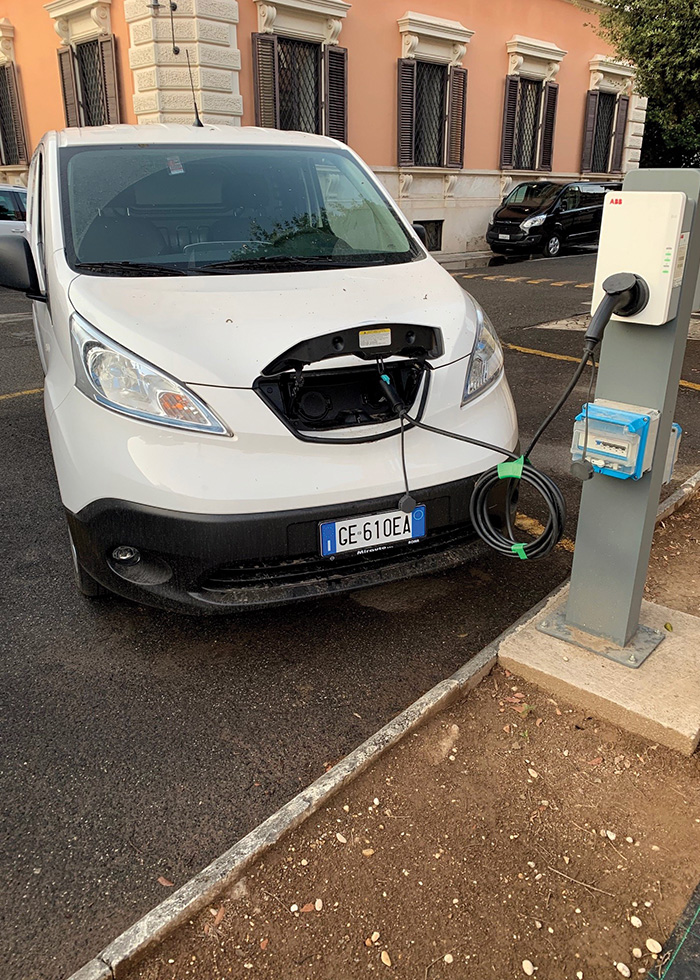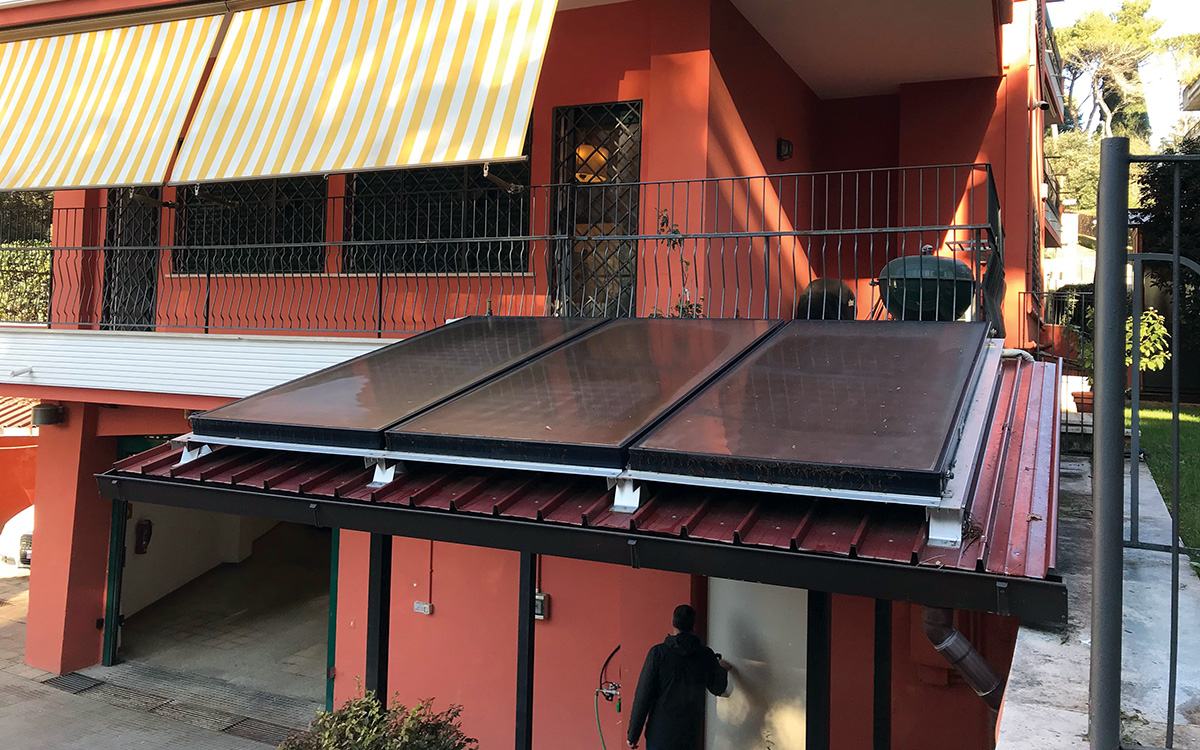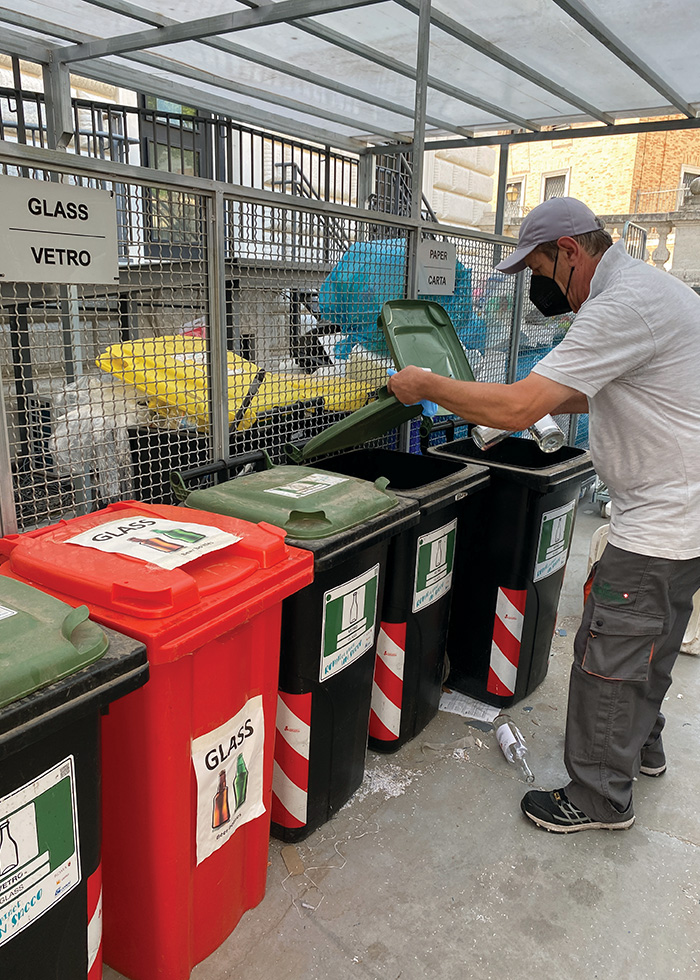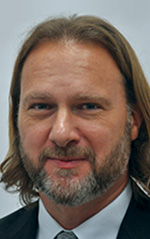Building a Foundation for Successful Green Diplomacy
Taking practical action to improve the Tri-Mission’s environmental footprint in Rome is smart diplomacy.
BY KENNETH L. MEYER

This “green” parking lot made of grass and pavers helps to disperse heat and facilitates rainwater management during storm events.
U.S. Department of State / Tri-Mission Italy
President Joe Biden has made tackling the climate crisis a national security priority, and Tri-Mission Italy has stepped up to do its part. Multilateral engagement through our three missions in Rome (U.S. Embassy Rome, U.S. Embassy to the Holy See and U.S. Mission to the U.N. Agencies) is critical in fighting for a cleaner environment with a better future; however, these are longer-term actions that could take years to bear fruit. To help ensure success in the shorter term that can bolster our diplomatic engagement, Tri-Mission Italy’s management section has made environmental stewardship an important component of how we approach facilities management.
We have taken pragmatic action to improve our environmental footprint in Rome, demonstrating to the Italians that we are serious about tackling the climate crisis. We are taking these steps right in their front yard, so to speak; and in the process, we are building a foundation for successful green diplomacy.
Simple Concepts and Complex Projects

A Tri-Mission Italy facility maintenance van is charged at one of the mission’s four electric-car charging stations in Rome.
U.S. Department of State / Tri-Mission Italy
To begin with, our main office buildings on our Rome campus are LEED (Leadership in Energy and Environmental Design) certified. This means we have complied with all environmental laws and regulations; occupancy, area and size ratios; and additional precertification requirements; and we share appropriate data on our energy efficiency and water usage. Achieving this on our historic campus, with buildings dating to the 16th, 17th and 18th centuries, demonstrates our commitment and leadership in energy and environmental design.
To reduce waste and increase recycling, the Tri-Mission became one of the first large-scale organizations in Rome to implement a waste-recycling program in collaboration with City Hall Waste Management. Monitored results show we are recycling 80 percent of our trash, and the city government estimates that 90 percent of our recycling material is reusable. As a result of our recycling success, we ultimately constructed a one-stop repository center on our Rome campus. The city was impressed with our center and assigned a specialty recycling subsidiary to work with the U.S. to manage the program moving forward.
Tri-Mission Rome has for several years been converting interior and exterior lighting systems to LED technology. Sixty percent of our functional space and 80 percent of our residences are now so equipped. The LED bulbs themselves cost more than regular incandescent bulbs, but due to increased life and lower energy consumption—LED consumption is 30-40 percent less than fluorescent bulbs—the long-term result is significant utilities savings.
In a complex project that reduces both fuel consumption and water runoff, we redesigned our deteriorating asphalt parking lot (approximately 100 parking spaces) to include permeable paving under the parking spots, and installed electric charging stations for our new hybrid, government-owned vehicles. Asphalt and concrete are materials that absorb and retain heat and contribute to “urban heat islands,” increasing energy costs (e.g., for air conditioning), air-pollution levels and heat-related illness and mortality.
Our green parking lot provides onsite stormwater management by allowing infiltration of runoff into the ground during storm events, thus greatly reducing runoff volume and rate, eliminating it entirely from small storm events and capturing up to 80 percent of runoff from larger events. The charging stations will significantly reduce reliance on fossil fuels for our official vehicles.
One usually does not think of an elevator renovation as a way to reduce power consumption, but that is exactly what we did at the Tri-Mission. We replaced our chancery elevators, installed in the early 1990s and experiencing seriously degraded performance. The new elevators use an energy-efficient traction system, reducing power demand by 50 percent, and are equipped with a regenerative drive that recovers the elevators’ braking energy (otherwise dissipated as heat on the electrical resistances). After converting the recovered energy to electric energy, the regenerative drive sends it back to the building electrical system to be used on other applications, consequently reducing elevator electric consumption by 20 percent. It seems complex, but the principles are really quite simple. Technology is enabling us to do incredible things with the right engineering.

Residential solar panels in Rome result in significant savings on natural gas.
U.S. Department of State / Tri-Mission Italy
Reducing Waste

The Tri-Mission Italy was one of the first large-scale organizations in Rome to implement a waste-recycling program in collaboration with City Hall Waste Management.
U.S. Department of State / Tri-Mission Italy
We further applied new technology and engineering to two of our chief-of-mission (COM) residences. After a major chiller failure at our U.S. Mission to the United Nations COM residence, we installed new natural gas–fired chillers that have an engine that spins the compressor to produce chilled water. One of the main advantages of this technology is that waste heat from the chiller’s operations can be recovered and used to produce domestic hot water. This greatly reduces the energy needed to perform this task separately, and it has lowered our utility bills for the property. At our historic Embassy Rome COM residence, we installed solar panels to heat the water for the swimming pool and to provide hot water to the locker room. Use of the solar panels has led to savings of approximately 60 percent on natural gas bills for the residence.
We also utilized solar technology at one of our government-owned apartment buildings, where we replaced outdated boilers with two small condensing boilers that integrate the heating energy produced by newly installed solar panels. In sunny Rome, the solar panels significantly reduce CO2 in the production of hot water. In addition, we redesigned the system to separate domestic hot water from the heating system, which eliminates the need for the heating boilers to run year-round and increases the system’s overall efficiency. We also replaced the primary and secondary pumps with more efficient inverter pumps. The entire boiler room is controlled by an automated management system that adjusts the heating-system supply temperature according to the outside temperature to save natural gas and avoid occupant discomfort during hotter days.
Since the Tri‐Mission official campus is located inside Rome’s historic district, it is difficult to install onsite renewable energy technology such as solar panels. We thus decided to buy renewable energy from an offsite provider through renewable energy certificates. This service, which we document through guarantee-of-origin certificates from the provider, contributes to annual carbon offsetting of about 3,000,000 kg (3,000 tons) of CO2—approximately equivalent to the amount of energy consumed annually by 360 homes in the United States.
Tri-Mission Italy’s management section continually seeks to make processes and facilities “greener.” This year the department recognized our achievements with the Greening Diplomacy Initiative Award for Excellence in Team Sustainability Performance. We hope that our efforts can serve as an example to others of pragmatic actions in the here and now to tackle the climate crisis.
Read More...
- “Solar Overseas: Harnessing the Sun to Power U.S. Embassies,” by Todd Evans, The Foreign Service Journal, July-August 2017
- “The League of Green Embassies: American Leadership in Sustainability,” by John David Molesky, The Foreign Service Journal, April 2014
- “Guide to Green Embassies: Eco Diplomacy in Action,” by Department of State OBO, January 1, 2014



